There are so many hotel booking sites out there today, it can be a painstaking task to attempt to filter through them all to truly find the best hotels deals. Advertisements suggest that a great solution is to use a hotel metasearch that aggregates all the other websites. But we can tell you firsthand those aggregators almost never actually work to find the best hotel deal.
So what are the best hotel booking sites in 2017 for the best deals? We have been booking hotels non-stop for the past three and a half years now. We have developed our favorite sites and booking strategies in the process. We tend to favor some of the more popular sites, as we have found they are popular for good reason. But we constantly keep a pulse on the latest emerging booking websites too, so we welcome bringing in new hotel booking websites into our searching routine to examine how they perform.
Our booking strategies do vary slightly depending on what region we’re in, but we aim to spend about $20-$40 per night while traveling around the world. That may seem like an unusually low amount, which would only land you in some nasty budget hotel. But that price range usually affords us nice mid-range accommodation in most places around the world. Many are surprised to learn that this low price range often even lands us a 4-star hotel.
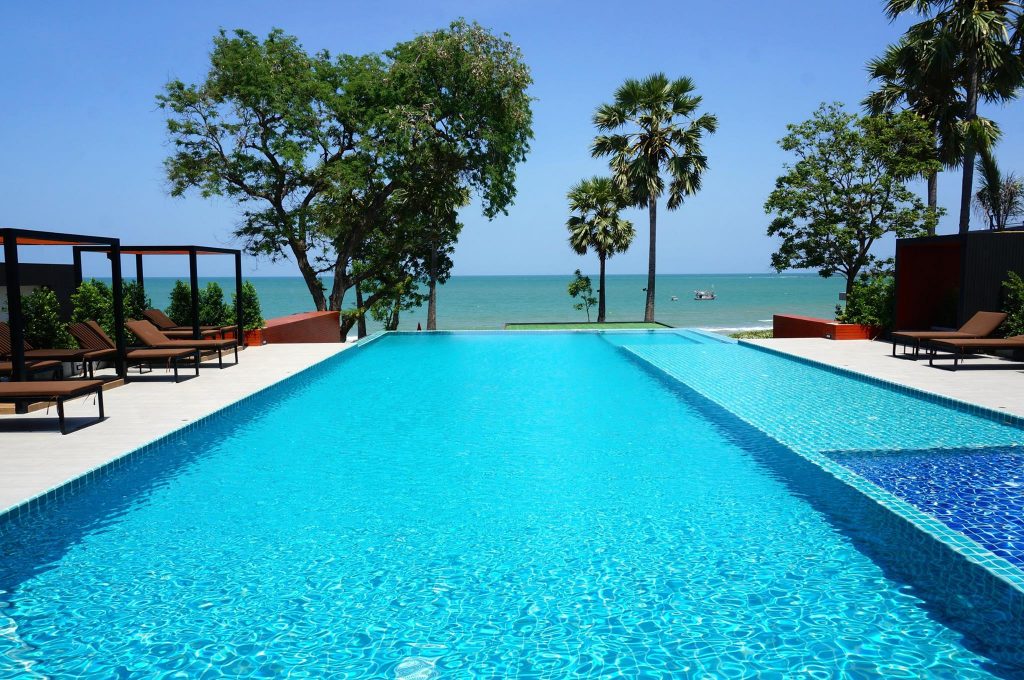
Ban Krut Beach Resort Thailand: $24 per night.
It is most certainly possible to travel on a budget, while still enjoying a decent standard. You just have to know where to look!
We’re now writing this post to report exactly what we think are the best hotel booking sites to snag a great deal, all around the world. It’s actually one of the most common questions we get, so we’re excited to finally detail what we find to be the best hotel booking websites.
Below are the accommodation booking sites we most recommend. You’ll likely recognize some familiar names that come at no surprise to you. But we hope we may impart some info to support why it can be best to use these booking sites. We’ll also show you the websites we suggest avoiding, some of which may surprise you. But first, here’s the sites we use regularly and recommend. Read on for a detailed explanation as to why, as we also share our online booking tips.
- OTA Priceline Group: Booking.com (or use Agoda in Asia instead)
- OTA Expedia Inc.: Hotels.com
- Semi-opaque deals: Hotwire and Priceline Express Deals (not the regular Priceline).
- Hostel search: Hostelz.com
- Apartment or room rental: Airbnb
- Price check: HotelsCombined.com
Now hang on tight; we’re now diving deep into the weird world of hotel booking sites.
Direct Booking Sites Perform Better Than Aggregators
Before delving further, you must first understand that there are primarily two types of hotel booking websites to search:
- Online Travel Agencies (OTAs) that you can use to search and book a hotel directly through the website.
Examples: Hotels.com, Booking.com, Priceline, Agoda - Travel Metasearch Engines (or aggregators) that search multiple OTAs and ultimately direct you to the OTA website to actually make the booking.
Examples: Trivago, Kayak, Hotelscombined, Hipmunk
Common sense would lead you to believe that a metasearch engine would ultimately yield the best hotel results since it searches hundreds of websites all at once. We have found that to be absolutely NOT true. I’m sorry to be the one to break this to you, but the Trivago guy has been lying to you!
We find that prices listed on aggregator sites, like Trivago, are even higher than what is listed if searching directly on the OTA websites themselves. These aggregators are full of errors! They frequently fail to pull in the correct star-rating of hotels and they miss other very relevant info.
Metasearch Fail: An Example
Here’s a real-life example to illustrate this point. We’re currently searching for a 3-star (or higher) hotel room in Guadalajara Mexico, with breakfast, wifi, decent reviews, and near the city center. Using this criteria in a direct booking site, we found a sweet deal at the Hotel San Sebastian de Compostela.
We then attempted the same search parameters on Trivago. But Trivago was NOT able to find this hotel with the criteria we entered, even though the Hotel San Sebastian de Compostela most certainly did meet all of our requirements.
So I tried to help out Trivago a little by searching Trivago directly for “Hotel San Sebastian de Compostela” and removing all search criteria. Trivago now found it, but Trivago showed a price of $38 per night if you book through a variety of sites, including Hotels.com. Yet searching Hotels.com directly for the exact same dates reveals the price to actually be $34. Trivago fail!
To make things even more confusing is that Trivago incorrectly boasts that the hotel is a 4-star property. In reality, it is a 3-star hotel, as Hotels.com correctly identified.
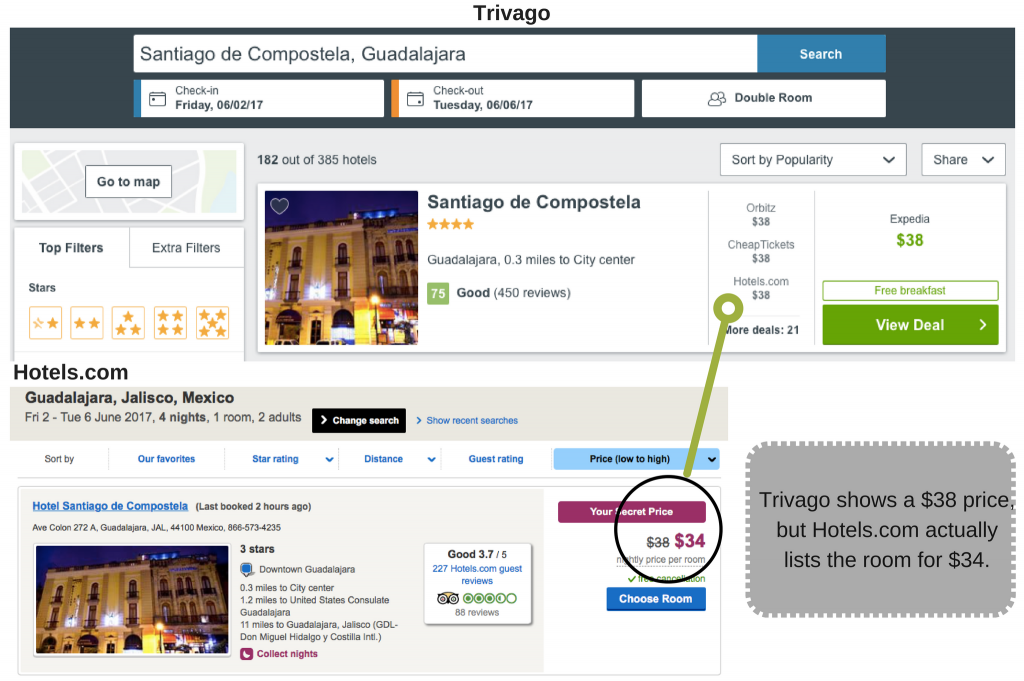
Yes, this is only one example. But we see the exact same inaccurate results at higher prices when we’ve attempted countless searches worldwide over the past several years of constant hotel bookings. I can easily replicate this failure almost anywhere, and I encourage you to try it for yourself. Trivago has never yielded the best deal. For us, it performs poorly at scouring through these other hotel booking sites. We found that the information Trivago aggregates simply can’t be trusted. Trivago seems to be spending lots of money on their incessant advertising campaign, but they should perhaps consider investing it into the very search technology they’re trying to sell you on.
We’re picking on Trivago a bit, but we’ve found this to be the case with nearly all of the popular hotel search aggregators. Part of the problem is due to a failure in the technology that scrapes the info from other hotel booking websites. Yet what complicates it even further is that most OTAs offer even deeper “secret pricing” to members who are logged-in to their sites, which the aggregators aren’t able to pick up on. Therefor, we find it is best to use the OTA sites directly rather than gather the fuzzy results that a metasearch like Trivago returns.
To further our support for OTAs over metasearches, we find the best search & filtering functionality to be directly in the online travel agencies. Search options become more limited on the aggregators since they have to attempt to normalize multiple data sources that use different metrics and scales. It’s a nearly impossible task.
While it may seem like a complete pain to have to search multiple OTAs instead of using one metasearch, we tend to find the best prices and hotel inventory by using only two main sites. So searching dozens of sites is never really necessary. Besides, nearly all the major booking sites are ultimately owned by the same two companies anyways. But we’ll get to that in a minute.
Are There Any Good Metasearch Engines?
If using a metasearch to aggregate multiple hotel booking sites, we recommend HotelsCombined.com. Although we are underwhelmed with its search functionality, we do find it performs better than other aggregators at returning more accurate results and better deals.
Still, HotelsCombined is not perfect. We’ve found some of the same errors using HotelsCombined as we mentioned with Trivago. But in our experience with Hotelscombined, the errors are fewer and farther between.
Yet to have better search functionality and lower prices, we don’t recommend beginning your search on HotelsCombined. Instead we recommend starting your hotel search process directly with an OTA such as Booking.com or Hotels.com. Then once you find a hotel you like, go ahead and run it through HotelsCombined.com to ensure you haven’t overlooked another site that offers better pricing on a hotel.
Really There’s Only Two Main Direct Hotel Booking Companies
Over the past decade or so, all of the biggest and best hotel booking sites have been bought by one of the two online booking giants:
- Priceline Group and
- Expedia, Inc.
The Priceline Group now owns Booking.com, Agoda.com, Priceline.com, among others. Meanwhile Expedia, Inc. is the parent company to Hotels.com, Orbitz, Travelocity, Expedia.com and many more.
As a result of these mergers and acquisitions, hotel inventory and even search technology is shared among the partner sites. So although there are seemingly dozens of great hotel booking websites, really it boils down to only two major worldwide players for a Coke vs. Pepsi type standoff.
Example: How Corporate Partner Sites Are the Same
We find that searching between the sites owned by the same parent corporation is usually time wasted. The results are almost always identical. Let’s continue with our real life example searching for a 3-star room in Guadalajara.
Here are the top 3 search results for Travelocity and Orbitz, respectively. Don’t they seem strangely similar? 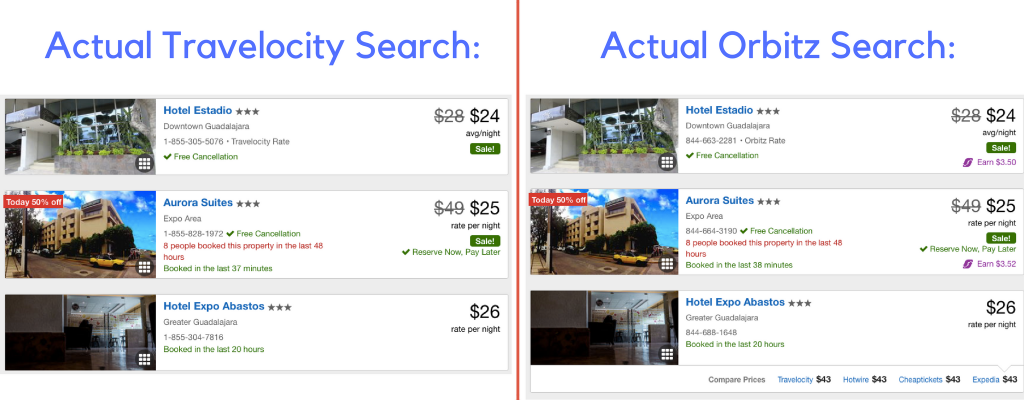
They are exactly the same! Even the display is nearly identical. There’s no need to search both hotel booking sites.
Interestingly, if you look in the very bottom of the Orbitz listings, you’ll see that it compares its low price for Hotel Expo Abastos against other OTAs within its own corporate family. In doing so, it shows the Orbitz price of $26 compared to Travelocity and others at $43. Yet, when looking directly at the Travelocity listing for Hotel Expo Abastos (shown on the left above), you’ll see it listed for $26 – not the $43 that Orbitz claims. Despite Orbitz’s attempt at suggesting it offers a better price than its corporate cousins; it does not.
Occasionally there are some minor difference between Expedia Inc’s portfolio of hotel booking sites. But those are rare exceptions, which we find is not worth the time involved of all of the extra searching. Instead, we have a single preferred search site among all of the hotel booking websites that Expedia Inc owns.
Meanwhile under Priceline’s umbrella, we have found there is a bit more variation in price and results. Still we have a single preferred booking site there too, which brings us to the next website we want to discuss: Booking.com.
Why Booking.com Is The Biggest and Often The Best
Chances are you’ve heard of this site and have probably use it too. At 40 million monthly visitors (source: ebizmba.com May 2017), Booking.com is by far the most popular hotel booking site in the world. And for good reason. We have consistently found that it yields the largest inventory of hotel listings and usually has among the lowest prices.
Booking.com tends to blow away the competition with the sheer number of hotels in its directory. If a hotel is listed on any online site, it has almost always found its way onto Booking. We like that Booking lists more than hotels too, as you’ll find hostels, apartments, guesthouses, and even campsites. Booking.com can be a one-stop-shop to find and book hotels around the world.
Booking has some of the best search & filtering functionality out there and the site carries robust reviews from verified stays. We also appreciate their unique pricing structure that shows rates based upon the total stay, rather than a nightly rate. Booking.com also sometimes include taxes and fees in the prices they show you, which is unusually honest. If not, they at least make the tax rates very apparent before arriving at the checkout screen. We haven’t noticed any other OTAs do that.
Booking.com also tends to have less restrictive cancelation policies than other sites and most of the time you don’t pay until arriving to your accommodation. There have been instances in which we haven’t been able to make it to a hotel and although Booking.com had every right to charge us for our no-show, they haven’t. That’s been a nice relief.
What could be better: It is sometimes annoying to only be able to filter by a preset price group (rather than exact price).

This Booking.com deal we stayed at was an all-inclusive 4-star Red Sea resort in Egypt for $27.50 per person that included all meals and even unlimited alcoholic beverages! More info here at: Luxury Egypt on a Backpackers Budget.
For Asia – Use Agoda Instead
We often default to Booking for our first search. But when in Asia, we instead head straight to Agoda.com, also owned by Priceline Group. Although it shares the same parent company as Booking.com, prices and listings are often different. In Asia, Agoda tends to come out on top for both inventory of hotels and prices. Plus, Agoda has great search functionality and even a decent rewards program.
While overall Agoda is the undisputed champ for Asia, many will use it exclusively while traveling through the continent. If you do that, you’ll miss some great deals. We have found some of the best deals on Asia hotels through other hotel booking sites. For example, that $24 beach resort in Thailand was actually found on Hotels.com.

This is that $24 beach resort in Thailand we found on Hotels.com. Beers not included. 
Here’s Why We Always Try To Book With Hotels.com
Under the Expedia corporate umbrella, our top pick is Hotels.com. Whenever we do find a price that is better than Booking, it comes from a site owned by Expedia. We find Hotels.com to be the best hotel search site within all of Expedia’s many brands. In our opinion, it has the slickest search & filtering features, enabling you to easily sift through listings with a fine-toothed comb. Hotels.com also has what we think is the best map function, allowing you see filtered results plotted by location in an easy-to-digest fashion.
Yet perhaps Hotels.com’s best feature is the ability to snag the absolute lowest price if you put in a little extra effort. It’s not uncommon for us to notice that hotels.com prices are actually slightly higher across the board. But once you apply some discounting techniques, it tends to drop prices below that of competing search sites. We also find that hotels.com can yield a small handful of hotels with significantly lower rates, compared to those in the Priceline/Booking group.
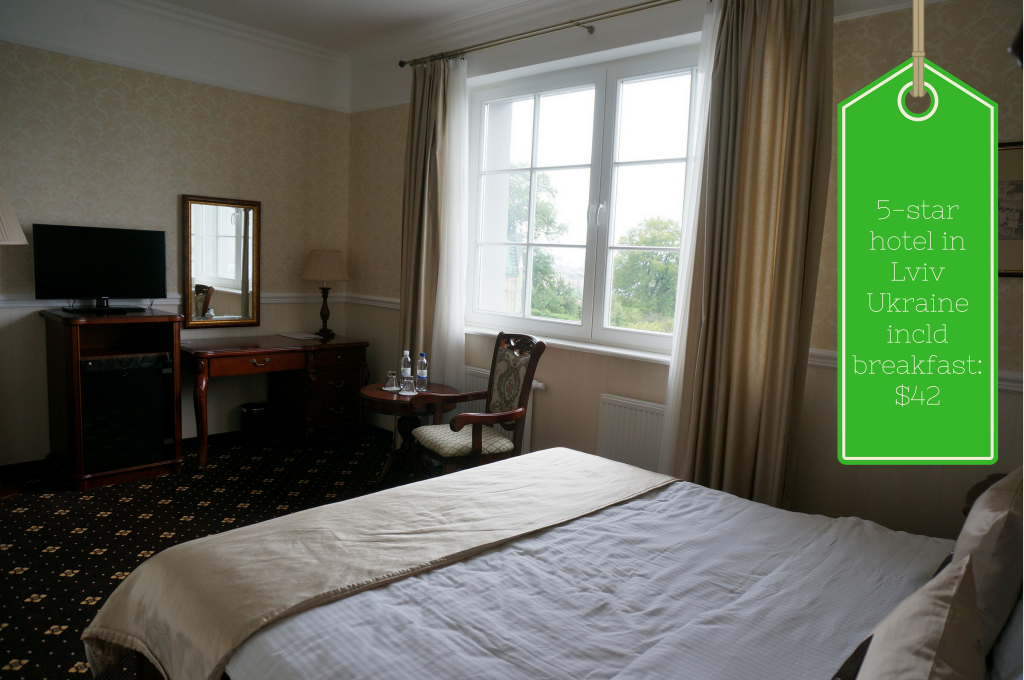
This was the first 5-star hotel deal we found using Hotels.com. We couldn’t believe it for under $50!
What could be better: While we tend to favor Hotels.com for its search functionality and price advantages, it usually does not have as large of an inventory as Booking.com. It tends to work better in larger and more popular destinations. Rural locations often turn up empty results. Also while the coupons and the rewards program are a nice perk, sometimes Booking.com can offer the same discounted rate without the need for coupon codes.
If Prices Are The Same Among Different Sites, Here’s Why To Book With Hotels.com
Regularly the prices between Booking.com and Hotels.com (and other hotel search sites) can be exactly the same. Whenever that happens, we prefer and recommend to book with Hotels.com. Here’s why:
Hotels.com Rewards Gives You One Free Night After Every 10 Nights
First of all, Hotels.com is one of the few hotel booking sites that actually offers its own loyalty program. Hotels.com Rewards basically gives you a free night stay for every ten nights you book with them. The price of those ten stays is averaged and that amount is credited to your account to use towards a future night’s stay. It can add up surprisingly quickly. Over the past three years, Hotels.com has already rewarded us with 2.5 weeks worth of free stays!
To look at it another way, basically their rewards program gives you 10% back for every night you book with them. This is the most generous reward we’ve found of any hotel booking site out there.
But Sometimes It’s Better To Use Coupons, Than To Get the Reward
Hotels.com frequently runs seasonal coupons. When offered, these coupon codes are easy to find, as they tend to pop-up immediately upon visiting the site. You simply have to remember to enter it at checkout.
But we only suggest using a coupon code if it is at least 10%-off or higher. Hotels.com does NOT allow you to earn a Hotels.com Rewards credit when using a coupon. So if a 5% coupon is the best available promotion at the time (often it is), then it is better to not take the coupon and instead receive your Hotels.com Reward credit (which is worth 10% of the value of your stay).
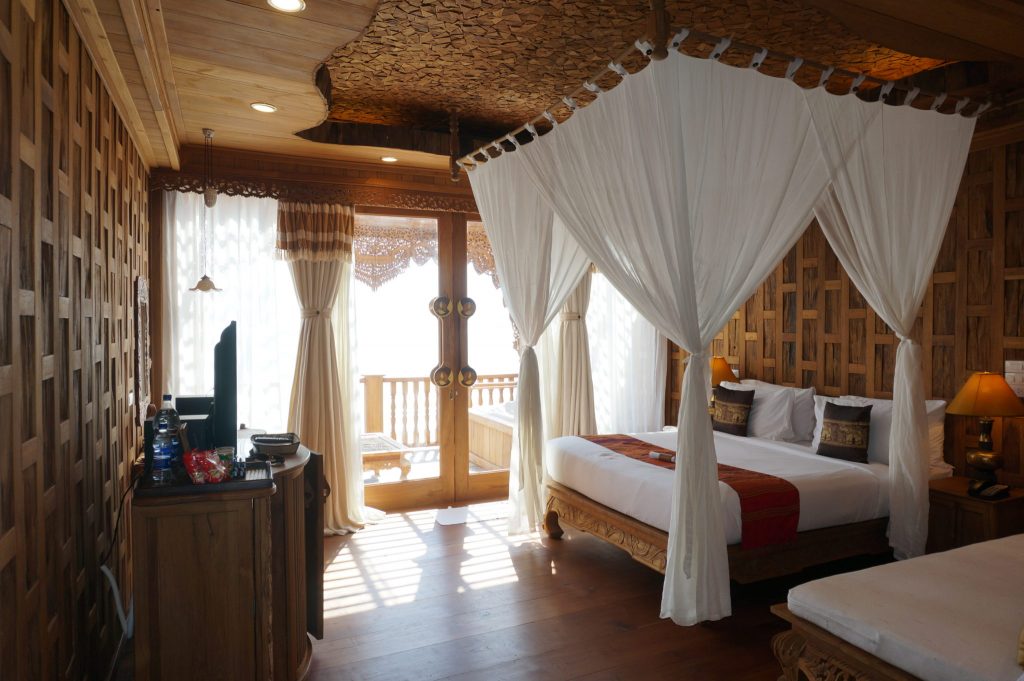
This 5-star resort in Thailand that we found on Hotels.com has been the nicest hotel we’ve ever stayed at.
Where To Find 4-Star Hotels for the Price of a Hostel Dorm:
Semi-Opaque Deals
We think semi-opaque deals are one of the most underutilized ways to get a steal on a room. We’ve used them to stay in 4-star accommodation all over the world for less than $40! We’ve even managed to stay in many of Europe’s capital cities over the summer high season and still maintained central locations with great deals that were less than most budget accommodation on the outskirts of town.
For one example of these semi-opaque deals, here’s the room we booked last year at a central 4-star hotel in Cape Town for $34 per night. Note: This same hotel is listed at $128 and higher on all the major booking sites. So that’s almost a 75% discount!

Hotwire hotel deal for 4-star hotel in Cape Town for $34. Image source: capetownmagazine.com
Meanwhile, private rooms in Cape Town hostels were being listed between $40-$80 per night!
With the concept of semi-opaque deals, you are provided with all the pertinent info for hotel listings that include star-level, general location, review score, and amenities. These hotels are all listed at a set price. A typically very low price is already revealed to you. What is kept concealed is the actual name of the hotel.
To be clear, these semi-opaque deals are NOT the same thing as the name-your-own price game that Priceline is known for. With these semi-opaque deals, you see a hotel listing (without its name and pictures) and you see a low price that is not negotiable.
It may seem a little unnerving to book blindly like this without knowing the exact hotel. Yet if you come across a 4-star hotel, with a 90% positive reviews, in a central location, and it’s listed for $34 per night – there’s pretty good likelihood you will not be disappointed. And sometimes with enough sleuthing, you can figure out what the exact hotel is. But when it’s clearly a great deal, we don’t even waste our time investigating.
We find this strategy tends to work best in big major cities in North America and Europe cities, but it’s worthwhile to check for any popular tourism destination. We’ve found some great semi-opaque deals in London, Munich, Brussels, and all throughout Spain and the US. We’ve found that these sites are almost never worth searching for smaller towns, rural areas, or off-the-beaten path places.
So What’s the Catch with Semi-Opaque Deals?
The only big downside to these semi-opaque deals is that they are non-cancelable and non-refundable. Once you book it, there’s absolutely no backing out. So be sure. Another drawback is not knowing the exact hotel until after booking, but that shouldn’t be much of a concern because there’s usually enough info revealed in the listing to make a sound decision.
Where To Book Semi-Opaque Deals
The two main booking sites to find these types of deals are:
(Note: you must go to the Express Deals section, NOT the regular Priceline.com)
So Which is the Best Semi-Opaque Website?
Sometimes Hotwire has better deals. Sometimes Priceline Express Deals has deeper discounts. It depends. They are the same concept but are two competing companies with different hotel agreements in place, so the deals are always different.
That said, we give the edge to Hotwire. We’ve had more success with Hotwire compared to Priceline Express Deals. Also we like that Hotwire allows you to sort by price, whereas Priceline Express Deals strangely does not. Still, we find it worth searching both.
Best Websites to Search Hostels
When a 4-star hotel is the same price as a hostel room, we’ll almost always opt to take that luxury hotel. Yet those unbelievable hotel deals aren’t always available throughout the entire world. Sometimes hostels are the only economical option in some of the destinations we visit.
A Note About Hostels For The Uninitiated
First off, this is just a quick note to our American friends out there who aren’t accustomed with hostels. Hostels are a great form of accommodation widely used all around the world, but they are somewhat of an oddity in the US. As such, they often receive a negative stigma and it’s falsely assumed they’re for college students on a very tight budget.
While hostels can be great for youth, not all hostels are created equally and there are some fantastic hostels in the world which are great options for 18 year olds and 80 year-olds alike. While dorm-style rooms and bunk beds are common hostel set-ups, most hostels also have private rooms, just like a hotel. That’s what we book.
Many of the hostels we’ve stayed at are even nicer than hotels or B&Bs in the same area! Plus, hostels usually have a fun vibe, and there’s typically a social area where it can be easier to meet people while traveling. You should NOT ignore the value of some of the great hostels around the world.
For example, check out this private “hostel” room we stayed at on the Wild Coast of South Africa for $30 per night. It’s probably not what you envision when you think of a hostel.
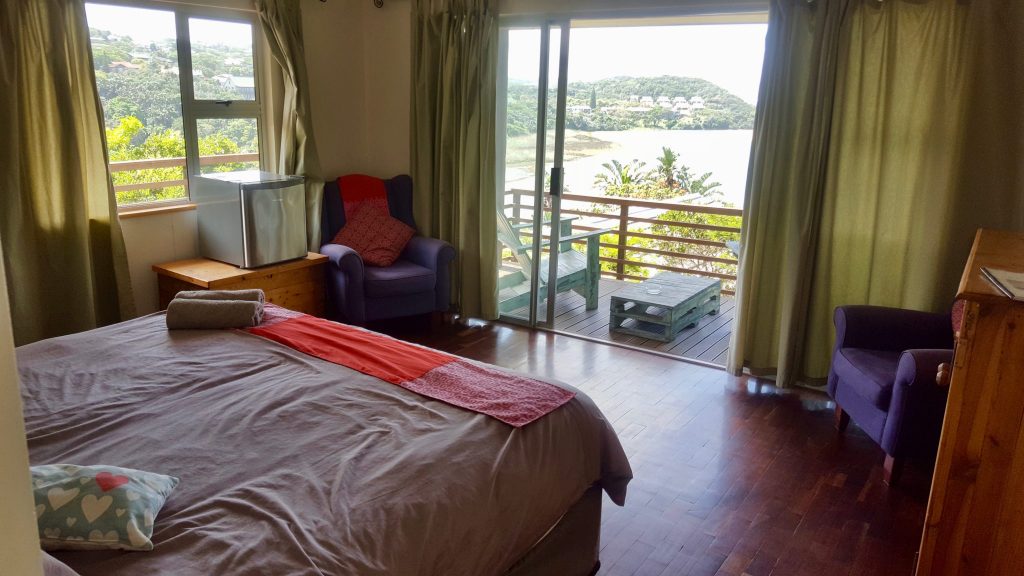
This $30 per night “hostel” room was a luxury experience that included a private balcony overlooking the Wild Coast of South Africa.
A Hostel Search That Is Better Than HostelWorld?
For those traveling internationally who use hostels, the website hostelworld.com has become the gold standard. It seems to have the biggest inventory of hostels and has an easy-to-use interface.
It is good. But there’s one site that we prefer even more. That is: Hostelz.com
Hostelz.com is a metasearch of all the main hostel sites, including hostelworld. It even searches Booking.com’s budget listings. Our experimenting with hostelz.com has shown it to perform well in scraping other site’s prices and details. So, this has become our go-to search site when we’re considering a hostel.
As couple travelers, we typically only stay in private rooms, and we love that Hostelz.com provides a very useful and functional filter to only search hostels that have available private rooms.
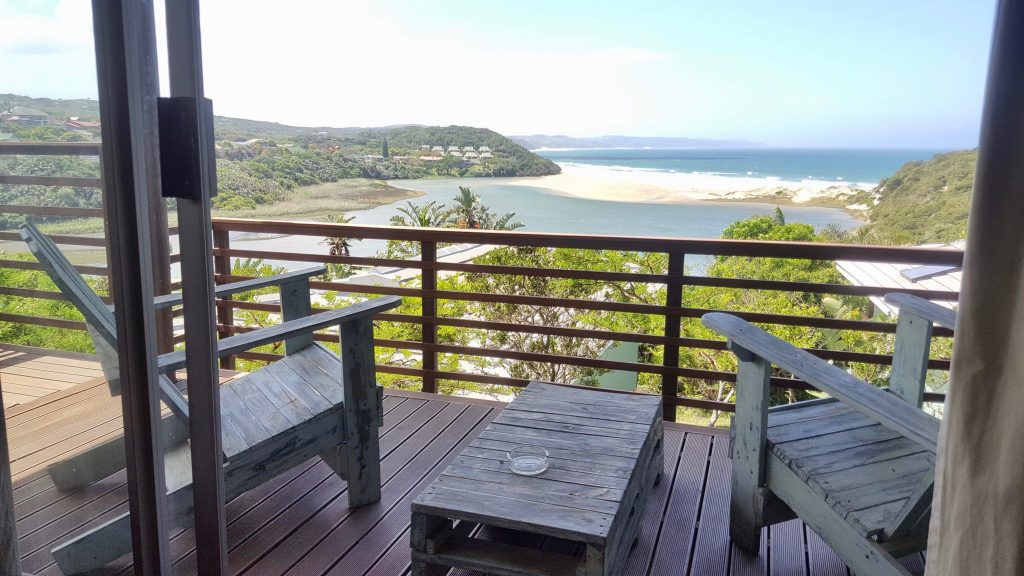
Apartments & Short-Term Rentals: Airbnb
Another great accommodation option that people seem to be considering more and more are apartment and room rentals such as Airbnb.
If You Don’t Know: What Is Airbnb?
If you’re not familiar with Airbnb, this is the site where hosts can list their entire house, apartment, or even private room in their home for guests to stay in. These rooms and apartments can be super nice, you end up experiencing a destination more like a local, and Airbnbs can often be a fraction of a cost of a hotel room.
Why We Use Airbnb
We love Airbnb. In the past, we tend to use it primarily for long-term stays of a month. As a result we have rented beautiful fully-furnished, well-equipped private apartments for as little as $15 per night. That rate included everything from wifi, water, and electricity to twice-per-week maid service, fresh local coffee, and even a weekly gardener to come by and tend to our private garden! This find was in the mountains of San Cristobal de las Casas, Mexico and has been one of our favorite Airbnb stays yet.
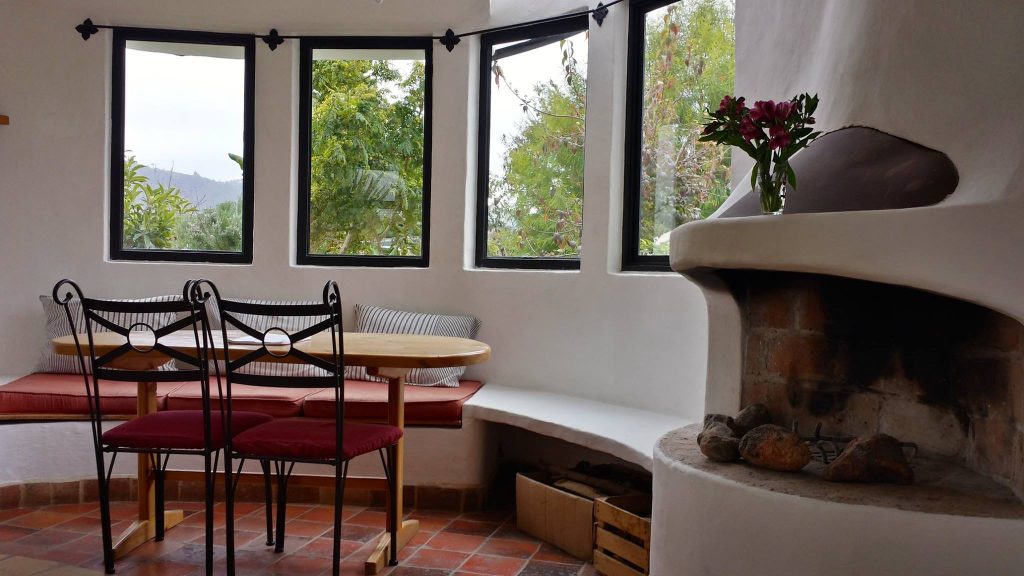
Many people don’t realize that Airbnb hosts provide significant discounts for longer stays, which can ultimately save hundreds of dollars during a longer booking!
But you don’t have to stay for a month to find good value with an Airbnb. It can also be good for shorter stays as well.
There are only some minor annoyances to be aware of which otherwise steer us towards a hotel for shorter stays. For one, with Airbnb you usually must arrange a meeting time with the host, rather than just show up at a hotel front desk. Checking in early or late can sometimes prove problematic. Also if your transport away from your destination is in the evening after checkout, you may find that you don’t have anywhere to store your luggage. Hotels can easily do that for you.
If prices are the same, we prefer hotel rooms because it tends to be an easier and smoother process. But there are times that even the best hotel deal may be four times more than a fantastic Airbnb room that has a consistent track record of great views. This is most often the case in US and Canada. In those instances, we’ll most definitely choose to save our cash by staying at an Airbnb, even if it is for just a night or two.
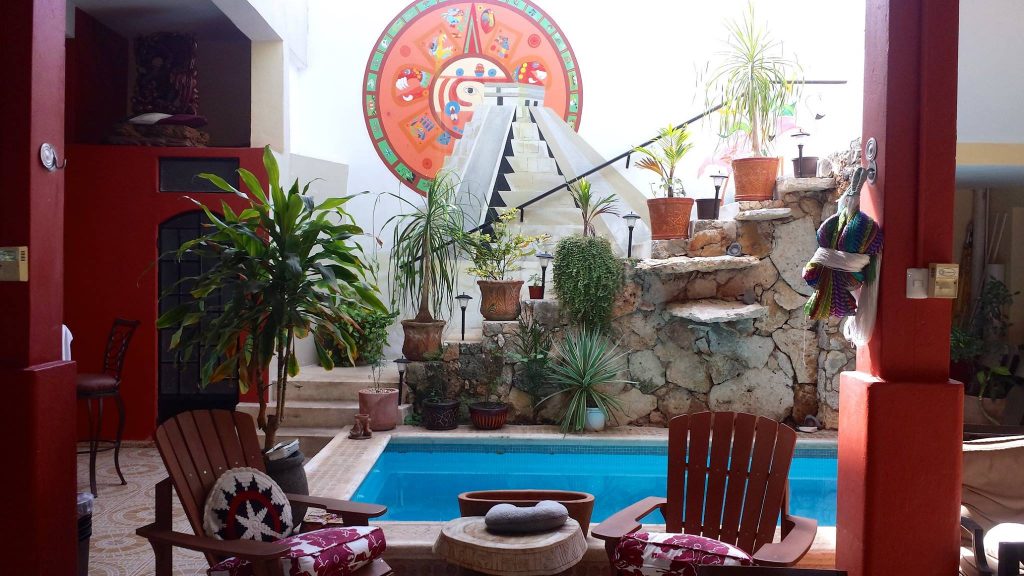
An Airbnb we stayed at in Merida Mexico
How To Use Airbnb Like A Champ To Score the Best Deals
1) Book longer stays. To get the best deals on Airbnb, search for a date range of 7+ nights, and even bigger bargains for 28+ nights. These discounts are set by each individual host, so the rate of discount does vary. We’ve even found (and have stayed at) a private apartment that offered an 80% discount for a 28-day stay, meaning that staying for a month is actually less expensive than staying for six days! Unfortunately there is no way to filter for listings that are offering these generous discounts for longer stays. But those particular deals tend to be fairly obvious if you search for a 28-night stay and adjust the price filter downward.
2) Book early. It’s even more important to book early on Airbnb than other accommodation. Unlike big hotels, which may have hundreds of rooms, Airbnbs are all one-of-a-kind. As a result, the best listings get scooped up well in advance. We find it to be very worthwhile to book an Airbnb as soon as possible to not only find the best places, but also to get the rooms and apartments with the best prices. Often you’ll find a flexible cancelation policy if you change your mind. So book early!
3) How to get an unlisted discount – Contact the host before booking. We always send the host a message before submitting a booking inquiry, simply to express interest in the apartment and to introduce ourselves. Sometimes this has led to the host immediately extending us a “special offer” because they want to close the deal and gain our business. We almost always accept in those instances and get an even further discounted rate! If you really want to be bold, you can even explain that their listing is at the upper limit of your budget and bluntly ask for a discounted rate. Some hosts may oblige! On a related note, be the perfect guest when you stay at Airbnbs. You’ll get good reviews and future potential hosts will then have a compelling reason to send you a special offer.
4) If in doubt, book trusted listings – We recommend to book places that have a consistent track record of good reviews. The only negative experiences we’ve ever had with Airbnb has been when staying at places without any prior reviews. In those instances it can be a total gamble and we haven’t been feeling very lucky. Now, we only stay at Airbnbs that have numerous 5-star reviews.
5) Use a coupon code – If you’ve never used Airbnb before, you can use our coupon code to receive $40 off your first booking. (They’ll send us a credit too for referring you, so we both win – yay for free money!)

We stayed in this Spanish town of Bubion at an Airbnb villa for a month for $900 ($32 per night).
Our Typical Hotel Booking Search Strategy:
To briefly summarize this post, below is our typical book strategy for anywhere we stay. We like to find the best deal possible and usually spend 10-15 minutes to go through this process. I usually just open up 5 tabs on my browser to easily enter in the dates and start comparing.
Here’s our process:
1) Search Booking.com (or use Agoda in Asia instead)
2) Search Hotels.com
3) Check if there are any great deals on Hotwire and Priceline Express Deals.
**If we’ve found a nice place by this point, our searching stops and we book. If not, we continue.**
4) Check Hostelz.com to see if there are any decent hostels.
5) Check Airbnb for any apartments or private rooms.
6) Before booking a hotel room, search HotelsCombined.com to see if there are any lower prices.
 ), you can add this link to your bookmarks to come directly back here when you’re ready to book your next hotel. Then you can simply click the links above to open up those tabs in your browser.
), you can add this link to your bookmarks to come directly back here when you’re ready to book your next hotel. Then you can simply click the links above to open up those tabs in your browser.Note: By using some of those links to book your stay, the companies will actually send us a few cents for referring you. That comes at no cost to you and you still pay the absolute lowest price available regardless of if you use those links or not. (So please use them!) It’s just a small way we use to help pay for and maintain this website, and to keep us traveling. We thank you for booking your hotels through these links and supporting Roaming Around the World! And do know that we wholeheartedly recommend those websites whether they toss a few cents our way or not. Most all booking sites offer a little something for sending you their way, but we’re only directing you to what we actually use and find to be the very best booking sites. We want you to get the best deal! (You can read our full disclosure policy here.)
Other Hotel Booking Site Tips To Get A Deal:
- Check the app: We like searching hotels on our laptop because we find a bigger screen easier to navigate. But hotel sites want you to adopt their app. As a result, they sometimes provide an even lower rate or coupon to app users. Once you find a hotel you like, it can be worth checking on the app for a lower price.
- Search weekends and weekdays separately: Hotels catering to business travelers offer deep discounts over the weekend. Meanwhile hotels catering to tourism have often have lower rates during the weekdays. If staying somewhere during the week and into the weekend, it can be worthwhile to change hotels on a Friday. During our last stay in London, prices at our weekday hotel were skyrocketing if we were to stay on Friday, so we switched to a nice business hotel for the weekend. As a result, the move saved us hundreds of dollars.
- Book directly on hotel sites: Hotels save money when you book directly with them rather than going through a hotel booking site. As a result, many hotel chains (e.g., Marriott, Hilton, etc.) are offering the lowest price exclusively on their own site. If you find a low rate on a chain hotel, it’s worth it to take the extra minute to price it out directly on the hotel’s corporate website.
- Longer stays: It’s not only Airbnb that rewards you with longer stays. Hotels do this too. We’ve seen instances where 4 nights are nearly the same as three. 5-night and 7-night stays seem to be breaking points. So if you are considering staying somewhere longer, definitely check the rates to see how worthwhile it may be to stay an extra day or two.
- Let a great deal take you somewhere new: Sometimes we simply want to find a good deal on accommodation, regardless of where it actually is. For example, in Thailand, we just wanted to relax on the beach for a few days and not pay much for it. In these instances we set our price and rating filters, then use the map function (we like hotels.com map functionality the best) to move around the map in the entire country to see where there may be any good deals. That brought us to Ban Krut. It’s an unheard of town. There’s nothing there. But there was a beautiful seaside resort for $24 and that’s exactly what we needed at the time.
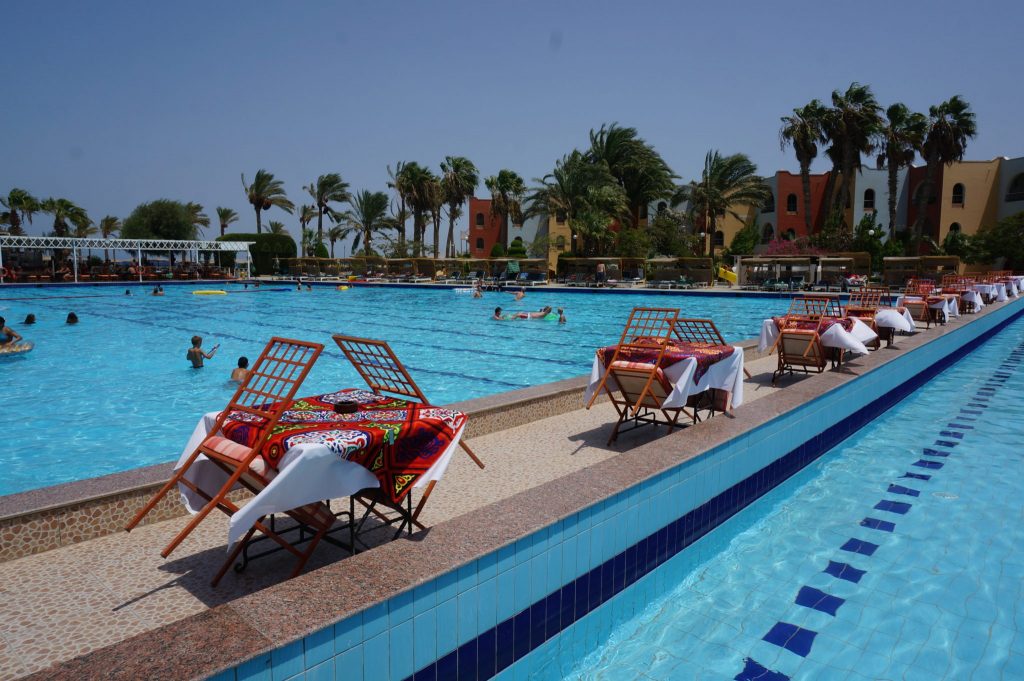
Accommodation Booking Sites We Don’t Use (And Why)
Homeaway: This site works similar to Airbnb, but Homeaway has never yielded us as many listings or as good of prices as we find on Airbnb. This also goes for VBRO and VacationRentals.com, which Homeaway now owns.
TravelPony: This hotel search site differentiates itself by requiring a registration & login. Shortly after TravelPony launched , a few years ago, I came across some compelling articles with data comparisons showing how the site most often has the lowest prices. As a result, I used it as one of our searches for nearly a full year of travel. During that time I never once found it to uncover the best deals compared to our recommended sites.
Trivago: This aggregator is a great idea in concept, but fails in execution. It’s filled with inaccurate info and doesn’t provide the lowest prices. Use at your own risk.
Kayak: We like Kayak for flight searches and love it for booking rental cars, but we find Kayak often falls short when acting as a metasearch for hotels for the same reasons I’ve already covered with Trivago.
Hipmunk: This site has some great search features and a cute little mascot, but ultimately we find better values searching directly with an OTA than to use this aggregator.
Expedia, Orbitz, Travelocity, Venere: Hotels.com is owned by the same parent company as these sites and hence regularly produces the same results. We prefer Hotels.com’s search functionality and rewards program more than all of its corporate cousins.
HotelsTonight: This is actually a good app that does have some legitimately great deals. But we’re always planning ahead these days, so the last-minute deals aren’t a good fit for us anymore. If you like to book last minute, then we absolutely do recommend this app.
SnapTravel: This recently buzzed-about hotel booking site that uses text or Facebook Messenger seems like a gimmick to get the growing millennial traveler’s money. The deals aren’t better than the sites we’ve suggested and despite them promising not to spam you, they have sent us unsolicited messages.

The Best Hotel Booking Websites To Search
So after 3.5 years of constantly searching for and booking hotels, those are what we have found to work in finding the best hotel deals out there. Which sites do you use? Let us know in the comments what your best hotel booking websites are. We find the hotel search sites that we’ve already noted to be the best, but we’re always looking for new ones to try out!
Happy searching and happy travels!
The post Best Hotel Booking Websites: Where To Find The Best Hotel Deals appeared first on Roaming Around the World.

